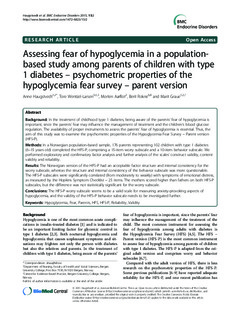Assessing fear of hypoglycemia in a population-based study among parents of children with type 1 diabetes – psychometric properties of the hypoglycemia fear survey – parent version
Peer reviewed, Journal article
Permanent lenke
http://hdl.handle.net/11250/2481701Utgivelsesdato
2015Metadata
Vis full innførselSamlinger
Sammendrag
Background In the treatment of childhood type 1 diabetes, being aware of the parents’ fear of hypoglycemia is important, since the parents’ fear may influence the management of treatment and the children’s blood glucose regulation. The availability of proper instruments to assess the parents’ fear of hypoglycemia is essential. Thus, the aim of this study was to examine the psychometric properties of the Hypoglycemia Fear Survey – Parent version (HFS-P). Methods In a Norwegian population-based sample, 176 parents representing 102 children with type 1 diabetes (6–15 years old) completed the HFS-P, comprising a 15-item worry subscale and a 10-item behavior subscale. We performed exploratory and confirmatory factor analysis and further analysis of the scales’ construct validity, content validity and reliability. Results The Norwegian version of the HFS-P had an acceptable factor structure and internal consistency for the worry subscale, whereas the structure and internal consistency of the behavior subscale was more questionable. The HFS-P subscales were significantly correlated (from moderately to weakly) with symptoms of emotional distress, as measured by the Hopkins Symptom Checklist – 25 items. The mothers scored higher than fathers on both HFS-P subscales, but the difference was not statistically significant for the worry subscale. Conclusions The HFS-P worry subscale seems to be a valid scale for measuring anxiety-provoking aspects of hypoglycemia, and the validity of the HFS-P behavior subscale needs to be investigated further.

